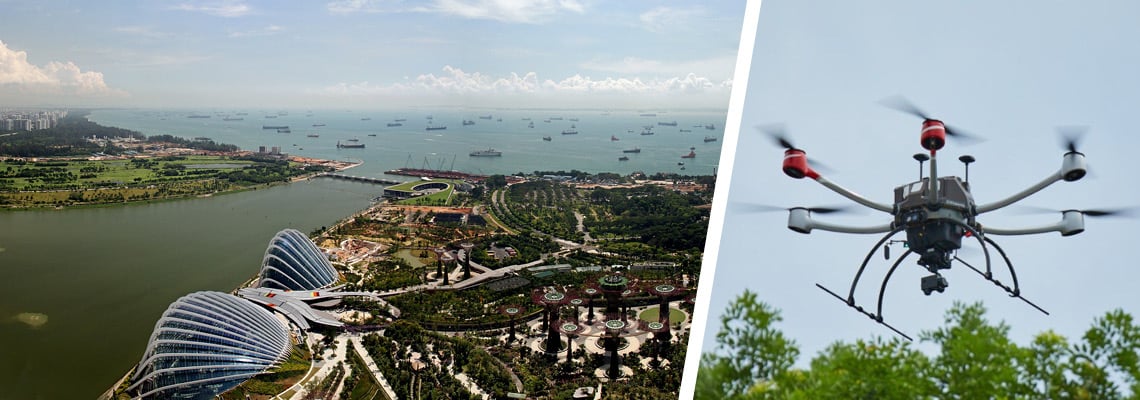Algae-monitoring drones to save 5000 hours in Singapore
Singapore water agency PUB is using Beyond Visual Line of Sight (BVLOS) drones equipped with remote sensing systems to monitor water quality and activities.
Near real-time video analytics
Singapore water agency PUB has said it could save up to 5000 hours by deploying drones to monitor six of its water reservoirs.
The utility will be using Beyond Visual Line of Sight (BVLOS) drones equipped with remote sensing systems and a camera for “near real-time video analytics”.
Programmed to observe water quality, the drones will deliver “near real-time video analytics” and will also be used to monitor water activities, including fishing and paddling.
“Annually 7200 hours are spent on daily patrols to look out for algal blooms and collecting data on water activities.”
PUB estimates that it spends a total of 7200 hours on daily patrols to look out for excessive aquatic plants and algal blooms, as well as collecting data on the water activities to ensure they are conducted safely.
Singapore engineering company, ST Engineering, was awarded the contract from PUB to use its drone operating system, DroNet, following trials last year. The drones will be housed in automated pods and capable of taking off and landing autonomously.
Drones, or Unmanned Aerial Vehicles (UAVs), are increasingly being used to help speed up monitoring processes in the water sector.
South Korean institute ETRI recently developed a UAV system to increase the speed of monitoring for algae in water by 90 per cent with the “world’s best level of accuracy in algae prediction”.
Elsewhere, UAVs have been adopted by New Zealand’s Auckland city council as part of a water quality monitoring project.
Navigating the SMART PUB roadmap
The drone development is part of a broader digital initiative by the utility called SMART PUB roadmap.
Launched in 2018, the initiative aims to digitalise the country's entire water system, enhance operational excellence and meet future water needs.
Notable developments include the roll out of 300,000 smart meters between 2021-2023 across residential, commercial and industrial premises.
Furthermore, the utility has been testing an “Autonomous Boat” to observe the quality of seawater intake to water treatment plants and perform water quality monitoring.
The boat can brave choppy waters to perform real-time water quality monitoring via onboard sensors, collect water samples, and take photos and videos of water conditions. Programmed to avoid obstacles, it can also self-navigate in the water to the designated sampling points.
Keeping reservoirs in optimal condition
PUB owns 17 reservoirs as one of its water supply sources for Singapore. The utility’s responsibility includes to effectively “monitor what does on at each reservoir and ensure the reservoirs are in optimal condition”.
“With the drones, we can channel manpower to more critical works."
Yeo Keng Soon, director of PUB's catchment and waterways department, said this could be a "challenge manpower-wise".
“With the drones, we can channel manpower to more critical works such as the inspection and maintenance of reservoir gates, as well as pump and valve operations,” he said.
“The drones also act as an early warning system that enhances our response time to the myriad of issues that our officers grapple with on a daily basis."
Share your water technology stories with us
Do you have an innovation, research results or an other interesting topic you would like to share with the international water technology industry? The Aquatech website and social media channels are a great platform to showcase your stories!
Please contact our Sr Brand Marketing Manager Annelie Koomen.
Are you an Aquatech exhibitor?
Make sure you add your latest press releases to your Company Profile in the Exhibitor Portal for free exposure.
We promise never to send you spam and you can unsubscribe at any time!
